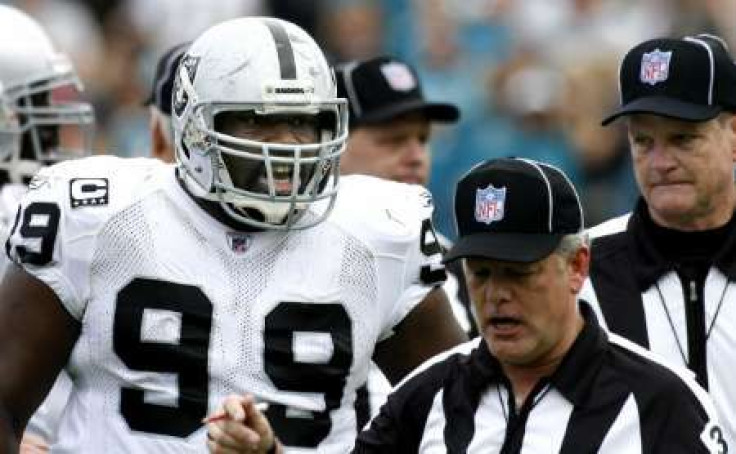Warren Sapp, Michael Vick Just The Latest NFL Players To Go Broke And Bankrupt; But Why?

The news that former NFL star Warren Sapp has been ordered by a court to auction off his Florida mansion was met with less public shock and more of a resounding, “Meh.” Sapp is just the latest retired athlete to have collected gargantuan paychecks during his career, only to squander it and have his financial woes splashed across headlines. The epidemic even inspired a recent ESPN 30 For 30 documentary, appropriately titled “Broke.”
Sapp, who had to auction off the Super Bowl ring he won with the Tampa Bay Buccaneers earlier this year, is on the hook for $6.7 million in debt. Now the Los Angeles Times reports that he has to give up his home – which comes with a water slide, two-story wine cellar, five full bathrooms, its own lake and a movie theater – or else face time behind bars.
“Do you think I wanted to declare bankruptcy?” Sapp said to the Associated Press. “Do you think, if there was any other way possible, I would have done it? It was either this or go to jail.”
The trend is hardly new. In 2009 Sports Illustrated published an article purporting that 78 percent of NFL players go broke just three years after retiring and 60 percent of ex-NBA players are in the same plight after five years out of the league.
Earlier this week, news broke that current Philadelphia Eagles quarterback Michael Vick had spent 95 percent of his income since filing for bankruptcy in 2008. Although Vick’s year behind bars certainly qualifies as an extenuating circumstance, it was found that he paid $10.9 million in taxes and another $9.2 million to creditors. Lawyers and accountants also earned a $2.7 million fee from Vick.
Along with Vick, Sapp joins recent NFL names like Terrell Owens, Deuce McAllister, Mark Brunell, Tiki Barber and a slew of others that have seen their bank accounts dry up. The reasons are as common as they are obvious.
NFL Agent Jack Bechta penned a column for the National Post earlier this year pointing out the most common financial issues he sees even the biggest starts go through. One of the earliest predictors of post-football bankruptcy is the ease with which players make their money.
Football stars are handed college scholarships and treated like royalty during their time on campus. Then, after draft day, they sign on the bottom line of a contract that often includes a massive signing bonus. That false sense of security only deepens after the deals that flow when a player puts up career-best numbers in a contract year.
When everything comes so easy for so long it’s hard to deal with the idea that there isn’t a lucrative job waiting for NFL superstars when their time in the league is done. Bechta writes that those factors -- combined with a messy divorce or a bad investment here and there -- are enough to sink what’s supposed to be a golden ship into retirement.
© Copyright IBTimes 2024. All rights reserved.











